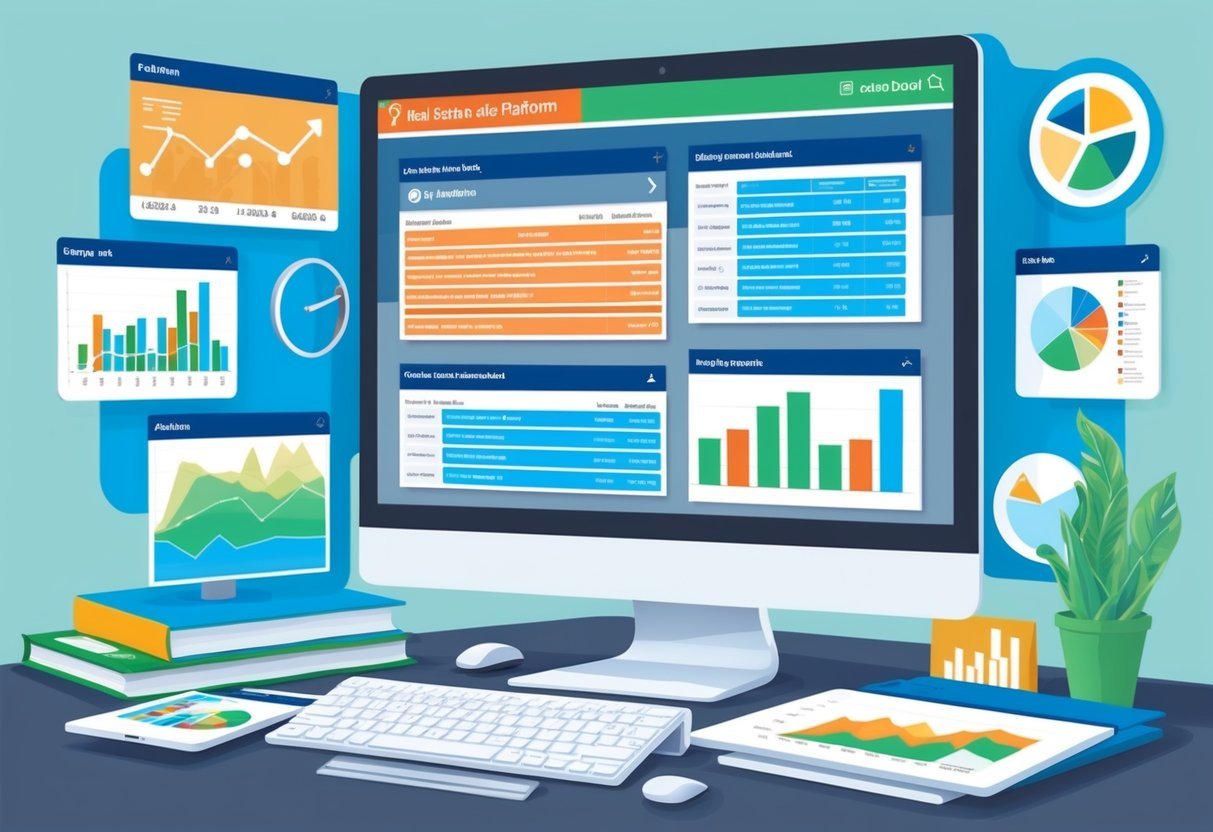Real estate data aggregation platforms have revolutionized the way property information is collected, organized, and accessed.
These innovative tools compile vast amounts of real estate data from multiple sources, providing a comprehensive view of the market.
By leveraging these platforms, you can gain valuable insights into property trends, pricing, and availability.

Property aggregation platforms offer you a centralized hub for exploring real estate opportunities and making informed decisions. Whether you’re a real estate professional, investor, or potential homebuyer, these platforms can streamline your research process and help you identify promising properties.
With the right platform, you’ll have access to up-to-date listings, historical data, and market analytics at your fingertips.
1) Zillow
Zillow has revolutionized the real estate industry by becoming a leading data hub for property information.
As a homebuyer or seller, you can access a wealth of information on this platform to make informed decisions.
The company’s success stems from its innovative use of big data and advanced analytics.
Zillow’s data science and engineering team processes vast amounts of real estate data from various sources, including public records and Multiple Listing Services.
You can benefit from Zillow’s machine learning algorithms that power features like home value estimates and price forecasts.
These tools can help you gauge market trends and property values more accurately.
Zillow’s mobile app and website offer user-friendly interfaces, allowing you to easily search for properties, view detailed information, and even take virtual tours.
This accessibility has made it a go-to resource for many in the real estate market.
The platform’s data streaming architecture ensures that you receive up-to-date information in real-time.
This feature is particularly valuable in fast-moving markets where timely data can make a significant difference in your property decisions.
By leveraging Zillow’s comprehensive data and tools, you can gain valuable insights into neighborhoods, property histories, and market trends.
This information empowers you to make more confident and well-informed choices in your real estate endeavors.
2) Realtor.com

Realtor.com offers a comprehensive platform for real estate data aggregation that can significantly enhance your property search and analysis.
As a professional in the industry, you’ll find their extensive database invaluable for your research needs.
The platform provides up-to-date statistics and market trends for various property types, price tiers, and locations.
You can access this information broken down by zip code, county, metro area, state, and even nationwide.
When searching for properties, you’ll appreciate the detailed listings that include high-quality photos, virtual tours, and neighborhood information.
This wealth of data allows you to make more informed decisions about potential investments or purchases.
Realtor.com’s user-friendly interface makes it easy to navigate through the vast amount of information available.
You can quickly filter results based on specific criteria, saving you time and effort in your property search.
The platform also offers valuable tools such as mortgage calculators and market insights, helping you stay on top of the latest trends in the real estate industry.
By utilizing these resources, you can gain a competitive edge in your professional endeavors.
Remember to regularly check Realtor.com for updates, as the real estate market is constantly evolving.
Staying informed with the latest data will help you make smarter decisions and provide better advice to your clients or colleagues.
3) Redfin
Redfin stands out as a powerful platform for real estate data aggregation.
You’ll find that this company offers a unique blend of technology and human expertise to provide comprehensive property information.
Redfin’s data center gives you access to downloadable housing market data.
This resource is particularly valuable because Redfin operates as a real estate brokerage, granting them direct access to local multiple listing services (MLS) data.
You can benefit from Redfin’s early and reliable insights into the state of the housing market.
Their real estate agents across the country contribute to the depth and accuracy of the information you receive.
Recently, Redfin partnered with Constellation1 for MLS data aggregation.
This collaboration enhances Redfin’s ability to provide you with up-to-date and accurate property listings.
The partnership with Constellation1 also supports Redfin’s market expansion efforts.
You can now access an expanded listing search experience covering more areas across North America.
When using Redfin for real estate data, you’ll appreciate the user-friendly interface and the wealth of information available at your fingertips.
From property details to neighborhood insights, Redfin strives to provide you with a comprehensive view of the real estate landscape.
4) CoreLogic

CoreLogic stands out as a leading provider of property data and analytics for real estate professionals.
You can access comprehensive information on properties nationwide through their platforms.
Their RealQuest application offers in-depth property and ownership search capabilities.
This tool can help you quickly identify new properties and gather essential data for your real estate transactions.
CoreLogic’s data solutions empower you to attract more leads and win more listings.
You’ll find integrated digital platforms that provide community and hazard insights, enabling faster and more intuitive decision-making.
When using CoreLogic, you can avoid modeling errors by relying on their stable and unique data for each property.
This consistency allows you to focus on unearthing valuable property insights rather than worrying about data accuracy.
The company’s property data API can streamline your workflow by reducing redundancies and errors.
You’ll be able to identify new properties quickly without complete dependence on public record data.
CoreLogic’s solutions are customizable to your specific needs.
They offer flexible pricing that considers your organization’s size and use case, ensuring you get the most value from their services.
By leveraging CoreLogic’s real estate data analytics, you can enhance your property analysis capabilities and make more informed investment decisions.
Their nationwide data coverage provides you with a comprehensive view of the market.
5) RealtyTrac

RealtyTrac is a valuable platform for real estate investors and agents seeking comprehensive property data.
You’ll find a wealth of information at your fingertips, including foreclosure listings and distressed properties.
The platform boasts an extensive property-level database covering over 90% of foreclosure properties in the United States.
This makes it an indispensable tool if you’re looking to invest in distressed real estate.
RealtyTrac’s user-friendly interface allows you to easily navigate through various property listings.
You can filter searches based on specific criteria, helping you pinpoint properties that match your investment goals.
When using RealtyTrac, you’ll gain access to detailed property reports.
These reports often include valuable information such as estimated market value, comparable sales, and historical data.
The platform also provides neighborhood-level data, giving you insights into local market trends.
This feature can help you make more informed decisions about potential investments in specific areas.
RealtyTrac offers educational resources to help you understand the foreclosure process and market dynamics.
These materials can be particularly useful if you’re new to real estate investing or looking to expand your knowledge.
By utilizing RealtyTrac’s tools, you can streamline your property research process and potentially uncover lucrative investment opportunities in the distressed real estate market.
6) Xome

Xome offers a comprehensive platform for real estate data aggregation that can enhance your property analysis and decision-making processes.
This service provides access to a wide range of real estate data and functionalities through its Property Insights API.
You can leverage Xome’s extensive database to gain valuable insights into properties and market trends.
The platform utilizes data from various sources, including public records and MLS listings, to generate accurate home value estimates.
When using Xome, you’ll benefit from its advanced Automated Valuation Model (AVM).
This technology incorporates economic modeling to provide you with up-to-date and reliable property valuations.
Xome’s user-friendly interface allows you to access information through both an online platform and a mobile app.
This flexibility ensures you can retrieve crucial real estate data whenever and wherever you need it.
By integrating Xome into your real estate strategy, you’ll have access to a wealth of information to support your property investment decisions.
The platform’s comprehensive data aggregation capabilities can help you identify promising opportunities and make informed choices in the competitive real estate market.
7) Black Knight

Black Knight stands out as a prominent player in real estate data aggregation.
You’ll find their Rapid Analytics Platform particularly useful for accessing comprehensive property information.
This cloud-based platform offers a wide array of real estate and capital market datasets.
You can leverage these resources to make informed decisions about property investments and market trends.
Black Knight’s platform provides access to multiple data sets, including sales and lease comparables, listings, vacancies, and market trends.
You’ll appreciate the ability to query and analyze this information efficiently.
The platform’s analytics capabilities allow you to gain deeper insights into specific commercial property data sets.
You can customize your analysis to focus on the metrics most relevant to your real estate goals.
When using Black Knight’s services, you’ll benefit from their coverage of numerous markets and submarkets across the United States.
This breadth of data enables you to make well-informed decisions regardless of your target location.
Real estate professionals find Black Knight’s platform transformative in how they work with technology, data, and analytics.
You’ll likely appreciate the innovative approach to accessing and utilizing real estate information.
Consider exploring Black Knight’s free trial option to experience the platform’s capabilities firsthand.
This trial provides read-only access to various data sets, allowing you to evaluate its potential benefits for your real estate endeavors.
Understanding Real Estate Data Aggregation

Real estate data aggregation transforms fragmented property information into actionable insights.
It empowers professionals to make informed decisions and gain a competitive edge in the market.
What Is Real Estate Data Aggregation?
Real estate data aggregation involves collecting, consolidating, and analyzing vast amounts of property-related information from multiple sources.
This includes data on property listings, sales history, market trends, demographics, and more. Advanced analytics quickly identify areas of focus and assess property potential with a predictive lens.
Aggregation platforms use sophisticated algorithms to clean, standardize, and organize data into a unified format.
This allows you to access comprehensive property insights effortlessly.
By leveraging big data technologies, these platforms provide you with real-time updates and accurate information to support your decision-making process.
Key Benefits of Data Aggregation in Real Estate
Data aggregation offers numerous advantages for real estate professionals:
-
Improved Market Analysis: Access to comprehensive data helps you identify trends and make accurate property valuations.
-
Enhanced Decision-Making: With a holistic view of the market, you can make informed investment and development choices.
-
Time and Cost Savings: Aggregated data eliminates the need for manual research, saving you valuable time and resources.
-
Competitive Advantage: Insights from aggregated data give you an edge in negotiations and strategy planning.
-
Risk Mitigation: Comprehensive property information helps you assess potential risks more effectively.
Property aggregation platforms offer centralized access to real-time data, ensuring accuracy and reliability in your analyses.
These tools empower you to streamline your workflow and focus on high-value activities.
Key Features to Look For

When selecting a real estate data aggregation platform, focus on accuracy, usability, and compatibility.
These factors will ensure you get reliable insights and a seamless experience.
Data Accuracy and Verifiability
Reliable data is crucial for making informed real estate decisions.
Look for platforms that source information from reputable databases and regularly update their records.
Check if the platform offers real-time data updates to ensure you’re working with the most current information.
Verify that the platform cross-references multiple sources to minimize errors.
Consider platforms that provide transparency about their data collection methods.
This allows you to assess the reliability of the information you’re using.
User Interface and Experience
A user-friendly interface can significantly impact your productivity.
Choose a platform with an intuitive design that allows you to navigate and access data effortlessly.
Look for customizable dashboards that let you prioritize the most relevant information for your needs. Automated list builders and lead management features can streamline your workflow.
Consider platforms offering mobile compatibility, enabling you to access crucial data on-the-go.
This flexibility can be invaluable when you’re in the field or meeting with clients.
Integration with Other Tools
Your chosen platform should seamlessly integrate with your existing tech stack.
This integration can enhance your overall efficiency and provide a more comprehensive view of your data.
Look for platforms that offer APIs, allowing you to connect with other software you use regularly.
This could include CRM systems, marketing tools, or financial analytics software.
Consider platforms that provide automated owner lookup and marketing automation features.
These integrations can save you time and help you identify potential opportunities more quickly.
Frequently Asked Questions

Real estate data aggregation platforms offer valuable insights for professionals and investors.
These tools compile property information, market trends, and analytics to support informed decision-making in the industry.
What criteria should be considered when choosing a real estate data aggregation platform?
When selecting a platform, consider data accuracy, coverage area, and update frequency.
Look for user-friendly interfaces and customizable reporting options.
Evaluate the platform’s integration capabilities with your existing systems.
Pricing models and customer support quality are also important factors.
Choose a provider that aligns with your specific needs and budget.
How can real estate professionals leverage data aggregation for market analysis?
You can use data aggregation to identify emerging trends and predict market shifts.
Analyze historical sales data to spot patterns in property values and demand.
Utilize demographic information to target marketing efforts.
Compare neighborhood statistics to guide clients towards suitable investments.
Which free platforms are available for real estate data aggregation?
Zillow offers free access to basic property data and market trends.
Realtor.com provides complimentary listing information and neighborhood insights.
Some government websites offer free property records and tax information.
Local multiple listing services (MLS) may provide limited free access to real estate professionals.
In what ways does real estate data aggregation provide value to investors?
Data aggregation helps you identify undervalued properties and high-potential markets.
Analyze rental yields, price-to-rent ratios, and historical appreciation rates to make informed investment decisions.
Use aggregated data to assess risk factors, such as foreclosure rates or natural disaster probabilities.
Leverage market insights to time your buying and selling strategies effectively.
What are the differences between various real estate data providers?
Providers differ in data sources, coverage areas, and specializations. Some focus on residential properties, while others offer commercial real estate data.
Pricing models vary, with some providers charging per query and others offering subscription-based access.
The depth of historical data and frequency of updates can also differ significantly between providers.
How does Zillow utilize data aggregation to enhance its real estate listings?
Zillow combines public records, MLS data, and user-submitted information to create comprehensive property profiles.
Their “Zestimate” feature uses aggregated data to estimate home values.
The platform leverages historical sales data and neighborhood trends to provide market forecasts.
Zillow’s data aggregation allows you to compare properties and track price changes over time.

